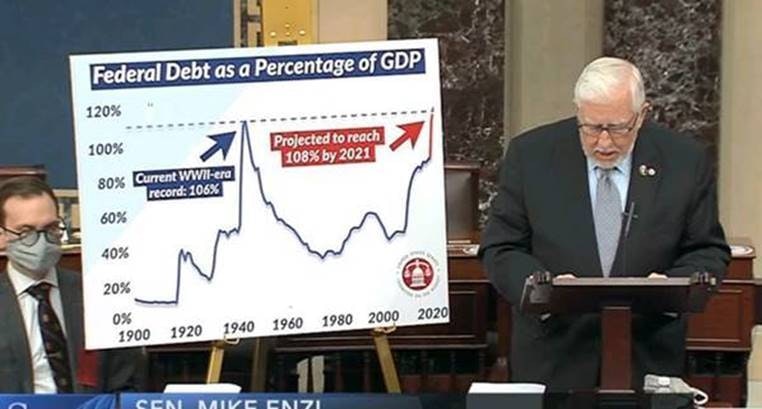U.S. Sen. Mike Enzi called on Congress to be mindful of the nation’s debt and deficit as legislators tackle a new bill to address the coronavirus pandemic.
As Chairman of the Senate Budget Committee, the senator has had a close eye on the debt as the numbers have ticked upward in the last few months.
During his speech on the Senate floor Tuesday, Enzi noted this fiscal year, the country has already run up a deficit of $2.7 trillion, more than triple the size of the deficit the country ran at the same time last year.
“I recognize the unprecedented crisis presented by COVID-19 and I supported the necessary response,” Enzi said in his speech. “When this crisis abates, and it will, the federal government cannot afford to return to the status quo of unsustainable budgets and surging debt that jeopardizes the prosperity of future generations. We have to start a serious conversation about how we are going to pay our bills and put our finances on a more sustainable path. We can justify aggressive borrowing and spending as necessary during times of crisis, but that cannot be our default.”
The Congressional Budget Office projects the country is on track to spend $3.7 trillion more than we take in this year, without any new coronavirus legislation. By the end of the fiscal year, the country’s publicly held debt will exceed the size of the economy and by the end of 2021, debt as a percentage of the economy will be higher than it’s ever been in United States history.
“We are spending billions of dollars without so much as a discussion of how to pay for things while we keep digging the hole deeper for future generations,” Enzi said. “More legislation may be needed to combat the virus and help the economy, but we cannot use the crisis to justify opening the spending floodgates and borrowing from future generations to fund non-emergency priorities. We all owe it to them to do better, and I hope we start to do so soon.”





